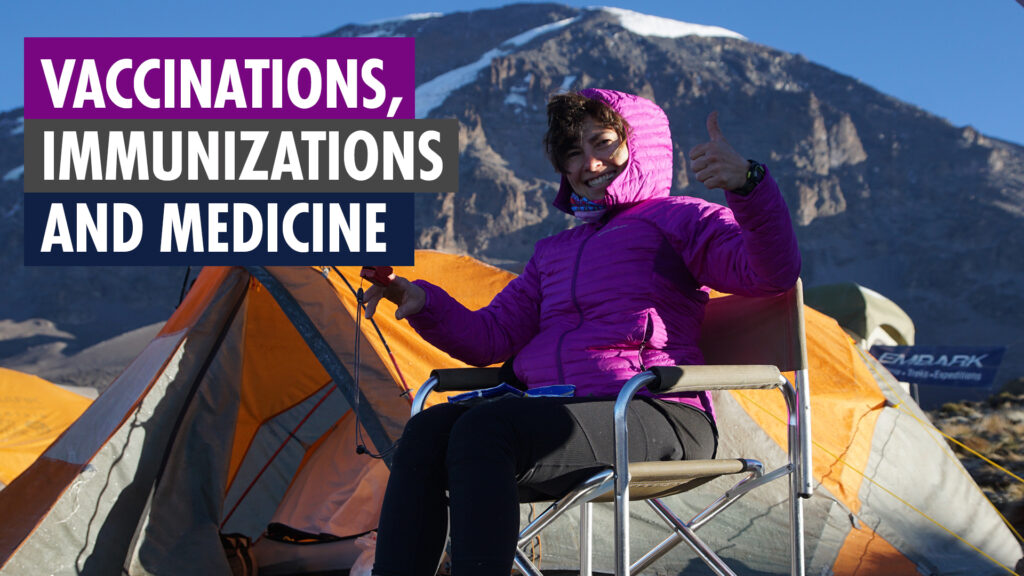
The Center for Disease Control (CDC) suggests that travelers heading to Tanzania may require specific vaccinations depending on their intended duration of stay and planned activities. These may include:
- Hepatitis A
- Hepatitis B
- Typhoid
- Rabies
The necessity of these vaccinations will vary based on your travel plans and the duration of your stay in Tanzania. It’s always wise to consult with a healthcare professional for personalized advice.
Also, our recommendation is to have the following vaccinations up-to-date:
- Polio/diphtheria booster
- Measles/Mumps/Rubella (MMR)
- Tetanus
- Flu
Of the above-listed vaccinations, most can be administered at the same time, fairly close to the time of departure. Only one, Hepatitis A, requires a series of two injections for full protection, about six months apart. Start by checking with your doctor on what vaccinations s/he and you decide you may need based on your itinerary and planned activity (hiking in primarily rural areas).
The CDC also informs us that Malaria is a risk while visiting lower elevations in Tanzania and Zanzibar. If you are going on a safari or trip to Zanzibar, you may need to take prescription medicine before, during, and after your trip to prevent malaria, especially if you are visiting low-altitude areas. See more detailed information about malaria in Tanzania
Regarding the risk of encountering the Zika virus while in Tanzania, the CDC says this:
“Zika is endemic ( http://wwwnc.cdc.gov/travel/page/epidemic-vs-endemic-zika ) in Tanzania, and we believe the risk to travelers is low.”
Last, Tanzania does not require a Yellow Fever card for entry unless you are entering from a country that does require it (the U.S. does not require it). If that applies to you, check out the link on their website:
It is possible that your health insurer will cover much of the cost of these vaccinations, and may offer a Travel Advice Clinic or hotline to provide advice. If not, try any of the major retail pharmacy chains, many of which offer sound medical advice to customers anticipating travel, at a moderate cost. If you have one, it is a good idea to travel with your vaccination record, just in case a doctor somewhere needs to know what vaccinations you’ve had. Keep a photocopy of it in your passport folder, along with First Aid certifications, American Red Cross blood type card, and any other special medical advisories you would want a care provider to know about in the event of illness or injury.
YELLOW FEVER ENTRY REQUIREMENTS IN TANZANIA MAINLAND
Yellow fever is a serious disease that is monitored internationally and therefore classified by the International Health Regulations (IHR), 2005 as a Public Health Emergence of International Concern (PHEIC). All PHEIC require specific monitoring procedures and measures that commensurate with and are restricted to public health measures to meet the IHR, 2005 purpose.
Tanzania is mapped by the World Health Organization as a low risk country because no Yellow fever virus has been isolated in the country.
However, the abundance of Yellow fever vectors and other favorable ecological conditions pose potential risk for Yellow fever if the virus is introduced into the country. Furthermore, being bordered with Yellow fever endemic countries has also increased the vulnerability of Tanzania being infected with the virus.
In order to conform to IHR, 2005 requirements and safeguard public health security in Tanzania, Yellow fever vaccination is mandatory to travelers arriving from Yellow fever endemic countries. This condition also applies to travelers subjected to long flight connection (transit) in Yellow fever endemic countries for twelve hours (12hrs) or more.
Yellow fever vaccination which is given as a single dose should be administered ten (10) days before entering the country. A single dose is capable of providing life protection against the virus. Exemption due to medical reasons and age (above 60 and below 1 year) should seek medical attention in case of fever, headache and muscle and joint aches. Failure to produce a valid certificate of vaccination against Yellow fever to those eligible may lead to refusal of entry or vaccinated upon arrival and kept under close public health observation for not more than 10 days.
The cost of Yellow fever vaccination is 50 USD for foreigners and 20,000 Tsh for residents and East Africa Community members. Government receipt shall be issued for any vaccination charges paid.
The following are endemic countries for which a valid certificate of vaccination against Yellow fever is a requirement for entry into Tanzania;
Note:
- Travellers coming from countries which are not in the list above will not be subjected to Yellow fever screening and vaccination at points of entry upon arrival.
- Foreigners coming from Yellow fever endemic countries who will not produce a proof of Yellow fever vaccination may lead to refusal of entry or be vaccinated and kept under close public health observation for not more than 10 days.
Medications
Other medications that we find useful to have, and which your doctor will cheerfully prescribe for you if you explain why you want them, include:
For Upper respiratory infections: Azithromycin (5-day doses called Z-Paks)
For Travelers Diarrhea: Imodium or Pepto-Bismol tablets (surprisingly, these are sometimes difficult to find in the pharmacies of developing nations)
For Altitude related symptoms: Diamox (Acetazolamide 250mg)
For a happy gut: Probiotics
For mild pain: Aspirin/Tylenol/Ibuprofen/Aleve
For hydration: Powdered Electrolytes
For a clean and wide-open nose: Saline solution
For small cuts or blisters: Neosporin
For, well, you know what this is for: Gas-ex
Other useful supplies may include a blister kit (bandages/moleskin/duct tape or surgical tape/scissors), small First Aid kit, sunscreen, lip balm, ear plugs and some hard candies.
You probably will not need all these items, and many of them can be purchased locally if needed. There may be other medications you will want to have with you, depending on your personal medical needs. Finally, you should always consult with your own doctor about the efficacy or suitability of any medication before taking it.
Please keep in mind that health recommendations may evolve, and new vaccinations or precautions may be advised. It’s essential to consult with a healthcare provider or visit a travel clinic before your trip to receive the most current and personalized advice based on your specific health situation and travel plans.







